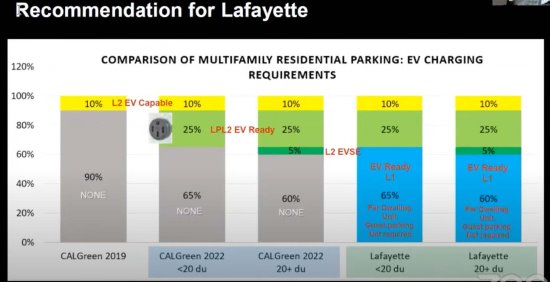
| ||||||
Prior to the planning meeting, one of the action items of the city's Environmental Task Force that was endorsed by the council was to increase community access to Electric Vehicle (EV) Charging facilities and to update EV Charging requirements for multi-family and commercial development projects. A video presentation by Assistant Planner Joshua Muller summarized the study process and findings that determined the updates and resulted in the recommendation for adoption of the revised ordinance by the council.
The draft ordnance establishes that multi-family, residential properties having less than 20 dwelling units must be 65% L1 EV ready, 25% L2 EV ready, and 10 % EV L2 EV capable. Buildings having 20 or more dwelling units must be 60% L1 EV ready, with 5% L2 EVSE ready, 25% L2 EV, and 10 % EV L2 EV capable. There are no requirements for guest parking.
All EV Capable charging spaces have a service panel and/or subpanel capacity and space(s) and are marked "EV Capable" with a label on the service panel or subpanel. A conduit is installed from the breaker box to a parking space, but no wiring is installed in the conduit and there is no charging outlet. EV Ready has a similar conduit, but has wiring and a charging outlet installed. EV Installed, has the same standards as EV Ready, with a charging unit mounted and ready to plug into an EV. Different charging speed capabilities include Level 1 (120 Volts), Level 2 (240 Volts) and Level 3 of Fast Charging (480 Volts). Electric vehicle supply equipment?(EVSEs) refers to equipment used in what is commonly called a charging station or charging dock.
In the commission's discussion of Muller's presentation with Environmental Task Force members Nancy Hu and Steve Kalogeras, commissioner Gary Huisingh asked to confirm that rented properties and owned properties had the same requirements. He also asked if higher requirements could be set for larger buildings, perhaps multi-family properties with 30 or more dwelling units. Kalogeras said no other cities included in their studies had higher percentages applied at greater density buildings and the standards in the staff recommendations came in sync with - and were designed to closely match - the CALGreen 2022 updates. The focus, according to Kalogeras, was on achieving the most cost-effective way for every unit to have access to charging. Breaker boxes installed for low capacity charging, he noted, can be capable of being upgraded to faster charging levels should that become desired or required.
Commissioner Greg Mason asked if residents would be allowed under the updated ordinance to rent out or lease their parking spaces to people other than owners and their families living in multi-family residential buildings. Planning Director Greg Wolff said, "If a resident wants to allow or rent out to someone to use a charger, they could do that. The electrical costs would be paid for by the resident because the wiring is not shared (or communal wiring that is covered by HOA or utility fees)."
Commissioner Kristina Sturm inquired if incentives for solar panels installed to provide electricity in the buildings might be offered by the city. Wolff said Lafayette is not planning to offer incentives specifically for EV charging, but noted the state of California has programs residents might choose to investigate.
The sole public comment came from Robert Lavoie, who said the EV code updates due to the expense was "one more nail in the coffin for affordable housing" and "the electrical grid is already unreliable and this would makes things worse."
Returning to the discussion while acknowledging the complexity and costs of the new requirements, Commissioner Farschad Farzan said the ordinance will put Lafayette in a strong position to handle "a movement whose time has come."
The commission unanimously supported the updated 2022-13 resolution with minor language revisions and sent a recommendation for adoption to the city council for acceptance, subject to public noticing before and after a final vote is taken.
Reach the reporter at:
